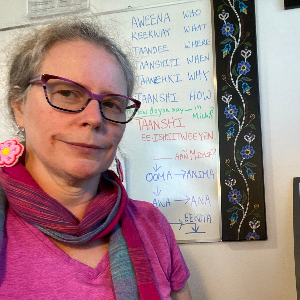Heather Souter
 Title: Faculty Member
Title: Faculty Member
Office: 4CM22
Building: Centennial
Email: h.souter@uwinnipeg.ca
Biography:
Heather Souter d-ishinihkaashon. En Michif niya. A Vancouver, BC gii-nihtawiikin eekwa ma paraañtii kayash oschi Mindapore (Calgary), Lac Ste. Anne and Edmonton, AB oschiwak. Eekwa, a Camperville ni-wiikin eekwa. My name is Heather Souter. I identify as a Michif (Métis) and am originally from Vancouver, BC, with roots in the Mindapore (Calgary), Lac Ste. Anne and Edmonton, AB areas. I have resided in the multilingual Indigenous community of Camperville, Manitoba, for almost 20 years. Since 2002, I have put my energy to the retention/revitalization/reclamation of Michif and other Métis languages and see myself as a Indigenous language advocate, activist and community-based researcher.
I would describe myself as an activist scholar with academic interests in Michif language, Indigenous multilingualism; Indigenous language learning and acquisition; Indigenous language pedagogy; Master-Apprentice Programs; digital curriculum resource development and Internet dissemination, the morphosyntax and lexicography of Michif and Great Plains Algonquian languages; language documentation; technology and Indigenous language learning; language revitalization and community capacity development; and revitalization and health and well-being.
Through my academic studies and professional experience, I have had the opportunity to develop a pedagogy and praxis that is grounded in Indigenous knowledge systems (specifically Métis) and that is community-centered and post-method in approach. Borrowing from Haley De Korne’s work, I focus on particularity (communicative repertoires and applications), practicality (participatory learning) and possibility (critical, transformative education). It is centered on socially just trauma- informed learner community development and that centres learners and disrupts conventional teaching practices by focusing on learner strengths and knowledges and valuing emergent skills and understandings. For example, most learning opportunities I provide are task and project-based with real world applications in mind. I encourage both individual and group work and usually assign a final project that requires learners to function as a community and present their learning to others in a “sheltered” but public setting. Depending on what learners have brought to the learning community, they have co-created stories and plays for public presentation, created video language documentation and learning resources, and developed digital language learning tools. As possible, I invite proficient Indigenous language speakers and knowledge keepers to collaborate with learners to develop projects of mutual interest. This allows for reciprocal intergenerational knowledge transfer and a porous and expanding community of practice leading to greater language and language revitalization skills development.
Most of my research is applied, but even the descriptive linguistic “discoveries” I have made have come through my practical engagement with linguistic data and my quest to create useful digital resources and aids for fellow Indigenous language learners. This and the understanding that language learning requires socialization and physical embodiment of cultural practices has informed my choice to publish with other Indigenous language revitalization practitioners and settler allies on the intersection of digital language technology, Indigenous language revitalization and relationality. The questions related to this that presently interest me concern how we can enact relationality using digital technologies and media that can both connect and further distance us from others. My general interest in Indigenous language technology has led to a specific interest in applied documentary and computational linguistic research and how community participation in the same can lead to capacity building and greater autonomy in the development of language revitalization initiatives. In addition to research on language technology and revitalization, I am interested in adult Indigenous language immersion programs—specifically Master (Mentor)-Apprentice programs (MAP), Indigenous language pedagogy and teacher training, community language planning in multilingual Indigenous nations and the development and role of standardized orthographies in language revitalization. Having recently written two papers on these latter two topics, I have plans to publish both in an upcoming anthology I will continue to pursue research in both these areas, language pedagogy, MAP and community language planning.
Outside of the classroom and my research activities, I attempt to connect with learners, Indigenous communities, and colleagues through participating in community initiatives, university-based public-facing language workshops, conference committees, and through organizing events and opportunities that privilege Indigenous language use and learning. I am co-founder and sit on the board of Prairies to Woodlands Language Revitalization Circle Inc., a Manitoba-based non-profit.
Courses:
ANTH-1409 (3) Michif 1
ANTH-1410 (3) Michif 2
ANTH-2407 (3) Language Revitalization
LING-4003 (3) Topics in Linguistics: Linguistics for Communicative Teachers
LING-4101 (3) Topics in Language, Culture and Communication: Mentor Apprentice Program
Publications:
Dormer, J., K. Chew, C. Child, S. Child, J. Hinson, J. Morgan, and H. Souter. "Orthography Choice in Indigenous Language CALL Courses." Canadian Journal of Applied Linguistics 27, no. 2 (2024): 85–111. https://doi.org/10.37213/cjal.2024.33397.
Pine, A., D. Huggins-Daines, C. Leeming, P. Littell, T. Montler, H. Souter, and M. Turin. "Zero-Shot Query Generation for Approximate Search Algorithm Evaluation." In Proceedings of the Eighth Workshop on the Use of Computational Methods in the Study of Endangered Languages, 65–73. Honolulu, Hawaii: Association for Computational Linguistics, 2025.
Prairies to Woodlands ILR Circle Inc., H. Souter, T. Ireland, C. Leeming, and M. Patterson. "Southern Michif for Learners." Version 1.8.0 (72). Mobile app. App Store, 2025. https://apps.apple.com/ca/app/southern-michif-for-learners/id6705136111.
Tulloch, S., L. Fontaine, and H. Souter. "The Role of Teacher Professional Learning in Indigenous Language Reclamation." Minorités linguistiques et société / Linguistic Minorities and Society, no. 24 (2025). https://doi.org/10.7202/1117937ar.
